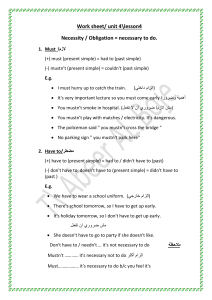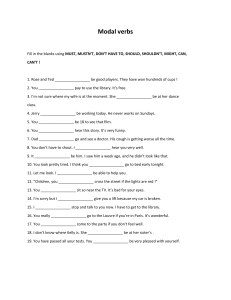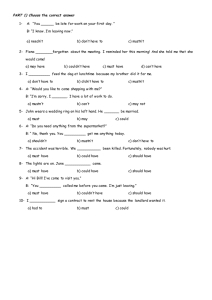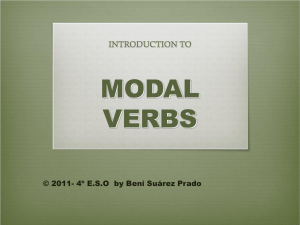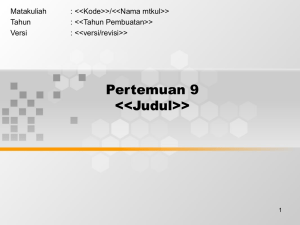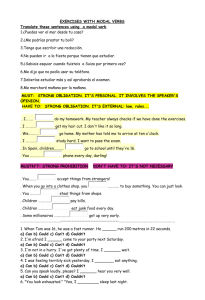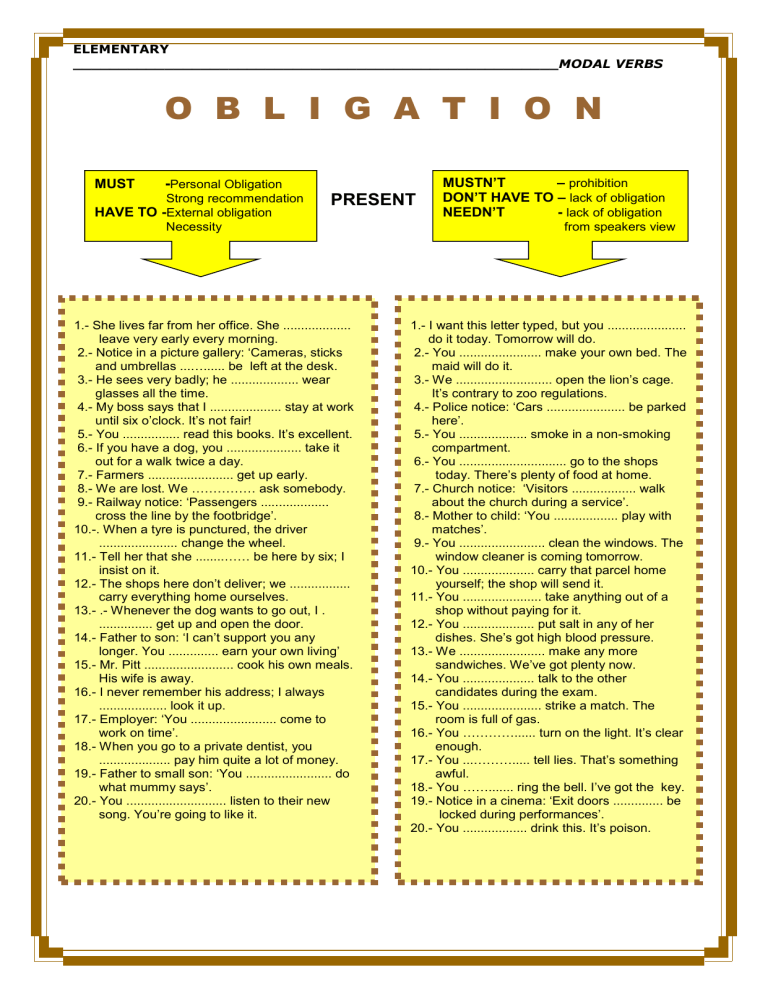
ELEMENTARY _____________________________________________________MODAL VERBS O B L I G A T I O N MUST -Personal Obligation Strong recommendation HAVE TO -External obligation Necessity PRESENT 1.- She lives far from her office. She ................... leave very early every morning. 2.- Notice in a picture gallery: ‘Cameras, sticks and umbrellas ...…...... be left at the desk. 3.- He sees very badly; he ................... wear glasses all the time. 4.- My boss says that I .................... stay at work until six o’clock. It’s not fair! 5.- You ................ read this books. It’s excellent. 6.- If you have a dog, you ..................... take it out for a walk twice a day. 7.- Farmers ........................ get up early. 8.- We are lost. We …………… ask somebody. 9.- Railway notice: ‘Passengers ................... cross the line by the footbridge’. 10.-. When a tyre is punctured, the driver ...................... change the wheel. 11.- Tell her that she ........…… be here by six; I insist on it. 12.- The shops here don’t deliver; we ................. carry everything home ourselves. 13.- .- Whenever the dog wants to go out, I . ............... get up and open the door. 14.- Father to son: ‘I can’t support you any longer. You .............. earn your own living’ 15.- Mr. Pitt ......................... cook his own meals. His wife is away. 16.- I never remember his address; I always ................... look it up. 17.- Employer: ‘You ........................ come to work on time’. 18.- When you go to a private dentist, you .................... pay him quite a lot of money. 19.- Father to small son: ‘You ........................ do what mummy says’. 20.- You ............................ listen to their new song. You’re going to like it. MUSTN’T – prohibition DON’T HAVE TO – lack of obligation NEEDN’T - lack of obligation from speakers view 1.- I want this letter typed, but you ...................... do it today. Tomorrow will do. 2.- You ....................... make your own bed. The maid will do it. 3.- We ........................... open the lion’s cage. It’s contrary to zoo regulations. 4.- Police notice: ‘Cars ...................... be parked here’. 5.- You ................... smoke in a non-smoking compartment. 6.- You .............................. go to the shops today. There’s plenty of food at home. 7.- Church notice: ‘Visitors .................. walk about the church during a service’. 8.- Mother to child: ‘You .................. play with matches’. 9.- You ........................ clean the windows. The window cleaner is coming tomorrow. 10.- You .................... carry that parcel home yourself; the shop will send it. 11.- You ...................... take anything out of a shop without paying for it. 12.- You .................... put salt in any of her dishes. She’s got high blood pressure. 13.- We ........................ make any more sandwiches. We’ve got plenty now. 14.- You .................... talk to the other candidates during the exam. 15.- You ...................... strike a match. The room is full of gas. 16.- You …………...... turn on the light. It’s clear enough. 17.- You ...………..... tell lies. That’s something awful. 18.- You ……....... ring the bell. I’ve got the key. 19.- Notice in a cinema: ‘Exit doors .............. be locked during performances’. 20.- You .................. drink this. It’s poison. ELEMENTARY _____________________________________________________MODAL VERBS MODAL MUST HAVE TO MUSTN’T NEEDN’T DON’T NEED TO PRESENT FUTURE PAST I must remember to pay I must remember to pay I had to pay the phone the phone bill the phone bill tomorrow bill I have to wear glasses I will have to wear glasses We mustn’t smoke here We mustn’t smoke in the future I had to wear glasses We weren’t allowed to smoke at school You needn’t wait for me You needn’t wait for me tomorrow morning You needn’t have waited for me. Thanks, anyway! He’s so clever. He doesn’t need to study. He doesn’t need to He knew all the answers, study for tomorrow’s so he didn’t need to study exam. He won’t need to study when he gets a job. 1.- If you come to my school next term , you (not) ........................................... wear a uniform. 2.- When I didn’t have a job. I (not) ……………………… get up so early every day. 3.- She is taking part in the next tennis championship, so she ……………………………train every day. 4.- My parents are very tolerant. I (not) ………………………………….ask for permission when I want to do something 5.- When we were at school we (not) ……………………………… wear mini-skirts. 6.- If you win the lottery, you (not) ……………………………….. work any longer. 7.- This cake is delicious. You …………………………………. taste it! 8.- Don’t worry about the cleaning. You (not) …………………………………do it right now. 9.- You (not, buy) …………………………… so much food. There were only four of us for dinner. 10.- Women (not) ………………………………….. vote at the beginning of the twentieth century. 11.- I don’t want you to get wet in the rain. You …………………………… carry your umbrella. 12.- You (not) …………………………… criticize other people. It’s something horrible. 13.- If you ride a motorbike, you …………………………………… wear a crash helmet. 14.- Good! The bus is coming. I (not) ……………………………….. wait any longer. 15.- To work in the laboratory, we ………………………………… wear a white robe. 16.- If she ...................................... leave early, she ...................................... go now. 17.- You (not) .................................... wake me up. I have my own alarm clock. 18.- You (not) ...................................... park here. It isn’t a parking zone. 19.- (you) ……………………………….. take your car to the garage last week? 20.- When you go on holiday next week, you ……………………… phone me everyday or I’ll be worried. 21.- You (not, spend) ………………………….. so much money on my present. It was far too expensive. 22.- Fortunately, I (not) ……………………….. buy a new TV set. It started working properly again. ELEMENTARY _____________________________________________________MODAL VERBS MUST - MUSTN’T - HAVE TO – DON’T HAVE TO 1.- You ............... do your homework as soon as you leave school. I don’t want you to be lazy. 2.- Children .................... (not) say rude words. 3.- You .........................(not) drive a car when you drink. 4.- It’s Saturday today. I .........................(not) go to work. 5.- I ........................ clean the house after the party last week. 6.- We ............................ help him to start walking again after the accident he had. 7.- Last week she .................. look after her sister’s children at the weekend. 8.- Students ......................... (not) cheat in exams. 9.- Children ....................... play with other children to socialise. 10.- I ..............................(not) ask anybody for a lift. I had my own car. 11.- I want to learn to do it by myself. You .........................(not) help me. 12.- You ............................. (not) eat with your fingers. 13.- You ............................ start a diet if you don’t lose weight with exercise. 14.- ............................(you) cook for your family everyday? 15.- ............................(you) cook for your guests last Saturday? 16.- We’ve got enough coffee. We .............................(not) buy any more. 17.- Nobody was hungry, so I ……………(not) cook anything. 18.- It’s raining. I ...............................carry an umbrella. 19.- The doctor always tells me I ................................ (not) eat fattening things. 20.- I’ve already done the washing up. You ……………… (not) do it. 21.- Notice in a museum: People .................... (not) touch exhibited paintings. 22.- There are no stamps. I …………….. buy some at the Post Office 23.- We ………………………..(not) pay anything. It’s a free buffet. 24.- ................................. (you) get a visa to travel to USA? 25.- You ……………………… be careful! 26.- The film was very interesting. You ................. go and see it. 27.- My mother always tells me that I ................... clean my own shoes, but I forget. 28.- As there was a general transport strike, we .................. walk to our house. 29.- I ................... (not) take an invitation with me. They know I am one of the guests. 30.- You ...............................(not) work very hard at my school. The lessons are very easy. 31.- She will come round, so I .....................................(not) phone her. 32.- We ..........................(not) miss the bus or we won’t be in time for the theatre. 33.- You ...............................(not) move - the robbers told us. 34.- Park notice: ‘All dogs ............................... be kept on leads. 35.- If you have a rich father, you ...............................(not) work at all. 36.- The baby is allergic to cereals. We (not) ………………..give him any bread. 37.- I …………………… a lot of medicines since I go this cold. 38.- You (not) ………………………. hit a child if he does something wrong. 39.- I ……………….. look up this word in the dictionary. I don’t know its meaning. 40.- Children, you ……………. tidy your room immediately. It’s all in a mess. ELEMENTARY _____________________________________________________MODAL VERBS REPHRASING – TRANSFORM THE FOLLOWING SENTENCES USING MODALS 1.- It isn’t necessary for us to finish the project until next week. _______________________________________________________________ 2.- Stop making so much noise. I’m trying to listen to the news. _______________________________________________________________ 3.- Chewing gum is not allowed in the classroom. _______________________________________________________________ 4.- It’s necessary for Mary to take her dog out three times a day. _______________________________________________________________ 5.- It’s isn’t necessary for you to give me an answer right now. _______________________________________________________________ 6.- Students aren’t allowed to use their dictionaries during the exam. _______________________________________________________________ 7.- It’s compulsory for people to pay taxes. _______________________________________________________________ 8.- It isn’t necessary for you to ask for permission every time you want to use the phone. _______________________________________________________________ 9.- Pick up everything you’ve left on the floor. _______________________________________________________________ 10.- It’s necessary for construction workers to wear a helmet. _______________________________________________________________ 11.- People aren’t allowed to feed the animals in a zoo. _______________________________________________________________ 12.- It’s necessary for people to get a work permit to live in the USA. _______________________________________________________________ 13.- It was forbidden for them to leave the office before 6 o’clock. _______________________________________________________________ 14.- It wasn’t necessary for their parents to emigrate. _______________________________________________________________ 15.- It will be necessary for Harry apologise for his behaviour. _______________________________________________________________ 16.- It is compulsory to fill in all the application forms to apply for the job. _______________________________________________________________ 17.- You phoned the fire brigade unnecessarily. I put the fire out myself. _______________________________________________________________ 18.- I insist on talking to the manager immediately. _______________________________________________________________ ELEMENTARY _____________________________________________________MODAL VERBS KEY Page 1 left Page 1 right 1. 2. 3. 4. 5. 6. 7. 8. 9. 10. 11. 12. 13. 14. 15. 16. 17. 18. 19. 20. 1. 2. 3. 4. 5. 6. 7. 8. 9. 10. 11. 12. 13. 14. 15. 16. 17. 18. 19. 20. has to must has to must must have to have to have to must has to must have to have to must has to have to must have to must must needn’t / don’t have to don’t have to mustn’t mustn’t mustn’t needn’t / don’t have to mustn’t mustn’t needn’t / don’t have to needn’t / don’t have to mustn’t mustn’t needn’t / don’t have to mustn’t mustn’t needn’t / don’t have to mustn’t needn’t / don’t have to mustn’t mustn’t Page 2 Page 3 1. 2. 3. 4. 5. 6. 7. 8. 9. 10. 11. 12. 13. 14. 15. 16. 17. 18. 19. 20. 21. 22. won’t have to didn’t have to has to don’t have to weren’t allowed to won’t have to must needn’t needn’t have bought weren’t allowed to must mustn’t have to won’t have to have to has to will have needn’t / don’t have to mustn’t Did you have to must needn’t have spent didn’t have to 1. 2. 3. 4. 5. 6. 7. 8. 9. 10. 11. 12. 13. 14. 15. 16. 17. 18. 19. 20. 21. 22. 23. 24. 25. 26. 27. 28. 29. 30. 31. 32. 33. 34. 35. 36. 37. 38. 39. 40. must mustn’t mustn’t don’t have to had to had / have had had to mustn’t have to didn’t have to needn’t mustn’t will have to do you have to did you have to needn’t / don’t have to didn’t have to have to mustn’t needn’t mustn’t have to don’t have to do you have to must must must had to don’t have to don’t have to won’t have to mustn’t mustn’t must don’t have to mustn’t have had mustn’t have to must ELEMENTARY _____________________________________________________MODAL VERBS Page 4 1. 2. 3. 4. 5. 6. 7. 8. 9. 10. 11. 12. 13. 14. 15. 16. 17. 18. We don’t have to finish the project until next week You must stop making so much noise. You mustn’t chew gum in the classroom Mary has to take her dog out three times a day We don’t have to give an answer right now Students mustn’t use their dictionaries during the exam People have to pay taxes You needn’t/don’t have to ask for permission every time you want to use the phone You must pick up everything you’ve left on the floor. Construction workers have to wear a helmet People mustn’t feed the animals in a zoo People have to get a work permit to live in the USA They weren’t allowed to leave the office before 6 Their parents didn’t have to emigrate Harry will have to apologise for his behaviour You have to fill in all the application forms to apply for the job You needn’t have phoned the fire brigade. I must talk to the manager immediately.
